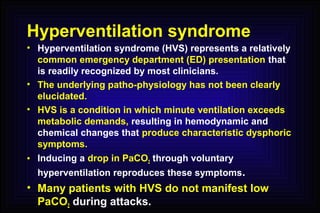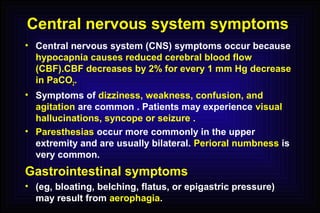Common Signs and Symptoms of Acute Hyperventilation Syndrome Include
Common signs and symptoms of acute hyperventilation syndrome include. Unilateral paralysis and slurred speech.
Common signs and symptoms of acute hyperventilation syndrome include.

. You are dispatched to an apartment complex where a 21 year old female has apparently overdosed on several narcotic medications. There are a variety of causes of hyperventilation. Chest pain does not necessarily indicate cardiac disease.
Common signs and symptoms of acute hyperventilation syndrome include. Acute HVS Acute Hyperventilation Syndrome is less common though more easily detected than chronic HVS. Diagnosis of hyperventilation syndrome.
Stress and fear often cause rapid breathing or hyperventilation. Patients with acute hyperventilation syndrome HVS may present with agitation and anxiety. Tachypnea an tingling in the extremities.
Anxiety dizziness and severe bradypnea. Anxiety dizziness and severe bradypnea. Common signs and symptoms of acute hyperventilation syndrome include.
Unilateral paralysis and slurred speech. Tachypnea and tingling in the extremities. Tachypnea and tingling in the extremities.
It is accompanied by agitation and a sense of terror or by symptoms of chest pain paresthesias peripheral and perioral peripheral tetany eg stiffness of fingers or arms and presyncope or syncope or sometimes by a combination of all of these findings. Hyperventilation syndrome produces a multiplicity of sensations to the patient and a multitude of symptoms and complaints for the physician to understand. Tachypnea and tingling in the extremities.
Common signs and symptoms of acute hyperventilation syndrome include. Acute hyperventilation syndrome Patients with acute hyperventilation syndrome present with dyspnea sometimes so severe that they liken it to suffocation. Anxiety dizziness and severe bradypnea.
Upon a first attack of acute hyperventilation syndrome HVS the diagnosis depends on recognizing the typical constellation of signs and symptoms and ruling out the serious conditions that can cause the presenting symptoms. Altered mental status and bradycardia. Pinpoint your symptoms and signs with MedicineNets Symptom Checker.
Tachypnea and tingling in the extremities. Altered mental status and bradycardia. Although sudden and extreme anxiety usually triggers discrete.
Unilateral paralysis and slurred speech. Anxiety dizziness and severe bradypnea. Symptoms of Acute HVS are often more dramatic than Chronic HVS and may include breathlessness or the inability to catch ones breath agitation rapid andor deep breathing chest pain dizziness heart palpitations and loss of consciousness.
The most common causes of acute chest pain encountered in dental situations include hyperventilation pulmonary embolism angina pectoris and myocardial infarction. Most commonly the history is one of sudden onset of dyspnea chest pain or neurologic symptoms eg dizziness weakness paresthesias or near-syncope after a stressful event. The symptoms of acute hyperventilation are mainly caused by the hypocalcemia.
If this isnt your first time hyperventilating and the problem gets in the way of your normal activities you may have hyperventilation syndrome. Patients with chronic HVS present with similar symptoms including recurrent chest. Acute coronary syndrome ACS and pulmonary embolism PE are two of the most common serious entities that may present.
It is accompanied by agitation and a sense of terror or by symptoms of chest pain paresthesias peripheral and perioral peripheral tetany eg stiffness of fingers or arms and presyncope or syncope or sometimes by a. Hyperventilation syndrome is a common disorder that is characterized by repeated episodes of excessive ventilation in response to anxiety or fear. Altered mental status and bradycardia.
Hyperventilation symptoms and signs include dizziness lightheadedness weakness shortness of breath and a tingling feeling around the mouth and fingertips. Unilateral paralysis and slurred speech. Patients with acute hyperventilation syndrome present with dyspnea sometimes so severe that they liken it to suffocation.
Furthermore decades of medical research have confirmed dozens of biochemical effects of hyperventilation symptoms that include cell hypoxia chronic inflammationgeneration of lactic acid and free radicals due to anaerobic cellular respiration excessive mucus production bronchoconstriction vasoconstriction over-excited state of nerve cells coughing sighing. Altered mental status and bradycardia. Upon a first attack of acute HVS the diagnosis depends on recognizing the typical constellation of signs and symptoms and ruling out the serious conditions that can cause the presenting symptoms.
The symptoms include palpitations lightheadedness breathlessness chest discomfort neuropathic pain chronic fatigue impairedinterrupted sleep gastrointestinal symptoms cognitive slowing and anxiety. Symptoms are manifold ranging from sensations of breathlessness dizziness paresthesias chest pains generalized weakness syncope and several others.

An Out Of Hospital Perspective On Hyperventilation Syndrome Journal Of Paramedic Practice

An Out Of Hospital Perspective On Hyperventilation Syndrome International Paramedic Practice


No comments for "Common Signs and Symptoms of Acute Hyperventilation Syndrome Include"
Post a Comment